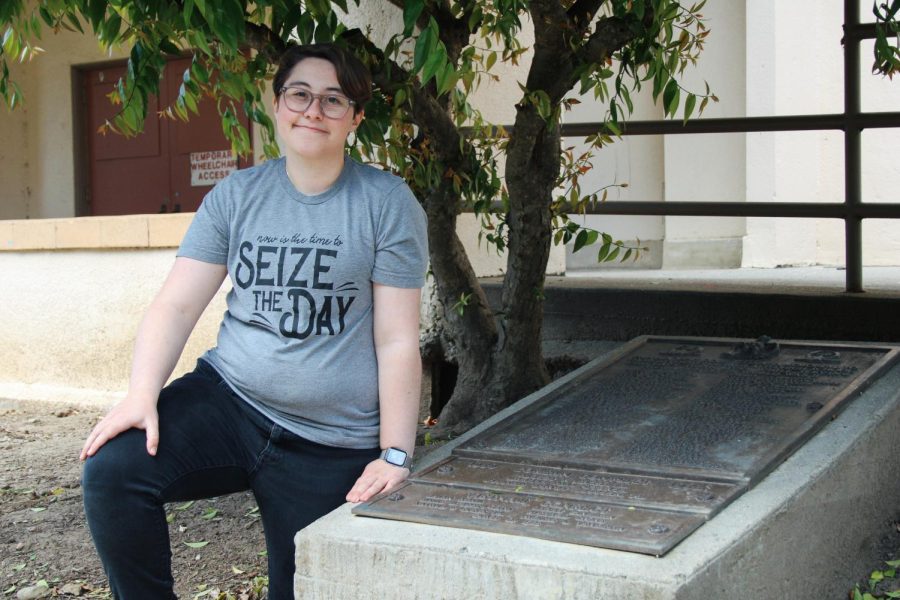Heroes are never forgotten
One students project to ensure that their memories live on.
Walking along the Senior Quad at Palo Alto High School, most students never realize what stands as the only remembrance of students long since past. In a hurry to catch up with friends or late to class, not stopping to read the lines engraved in metal both rusted and corroded. But standing still in time, the Veterans Plaque still shines, begging to tell the stories of heroes.
Two years ago, now-senior Harvey Vostrejs strode past the plaque, and it caught his eye.
He noticed that although hidden by bushes and dirt, the plaque felt like a calling. Brushing his fingers on the cold surface, he decided to find out who these people were.
“I was looking at it,” Vostrejs said. “I was like, who are these people?”
Vostrejs has since researched alums veteran heroes who died in combat during World War I and World War II. Delving into their past, he has written a book on their lives to showcase the students and their accomplishments.
At first, his interest was reserved for his prep period or free time. But as he delved deeper into the cause, Vostrejs decided to expand his research.
“I was putting faces to names, learning more about them. And I was like, people should know about this,” Vostrejs said.
This two-year-long project started simply by looking at Paly records made by student journalists.
“I started with the yearbooks to get like a basis so I could, you know, find a face and I can see what clubs they were a part of that kind of thing,” Vostrejs said. “And then from there, I used the (Paly) Journalism Archive.”
To broaden his search, Vostrejs visited the National Archives to find more information in government documents.
Darla Secor, historian and archivist at the Palo Alto Historical Association, met Vostrejs in the association’s re-opening to the public after COVID, where Secor showed him the obituary where he gets most of his information from.
“Harvey’s enthusiasm for not only his project, but for history in general, has been so cool to see,” Secor said.
Vostrejs recounted the roadblocks that prevented him from getting the know students’ past.
“There was so much information or a big supreme lack of information and I couldn’t tell,” Vostrejs said. “You know, it felt like I couldn’t find anything on someone. I felt like a failure. It was like, all I have is a name. I don’t know who you were. I have a death date maybe if I’m lucky, but I don’t know who you were. And I want to share your story.”
As more time went on, word spread of Vostrejs project.
“I did outreach and basically reached out to anyone who might know anything and then they connected me to other people as a whole spiderweb of communication,” Vostrejs said.
Of 85 veterans, some family members were able to contact Vostrejs and recount the heroes once-ordinary lives.
“I’m hoping more will reach out to me as time goes on because it’s a living document and I’m still getting veterans reaching out to me,” Vostrejs said.
At the Golden Gate cemetery, Vostrejs encountered multiple families as he wandered and paid tribute to the fallen.
“We didn’t speak much but it was this connection just like you know, a grief even if it wasn’t someone I knew,” Vostrejs said.
On a trip to the Vietnam Memorial in D.C, Vostrejs printed out pamphlets of information on Vietnam veterans. Assuming no one would read them or leave them to get blown away in the wind, he was surprised to see a pair of kids read its contents and scan the wall for a name.
“I heard this little boy, he was looking at Arthur Grimes [and] goes, ‘He wants to be a drummer like me!’” Vostrejs said.
Its these moments that make Vostrejs project that much worth it.
“They’ll probably look back and wonder…what are you talking about, but to me that will be a memory that I will never forget,” Vostrejs said.
Vostrejs is moving to Boston in the fall but will ultimately make trips to D.C to visit the National Archives and cemeteries along the east coast to Virginia where most of the Paly alums are buried.
“Even if I’m leaving Paly, these stories … these people have become so important to me that I want to keep learning,” Vostrejs said.
Eric Bloom, one of Vostrejs’ Social Justice Pathway teachers says this book is the kind of action that inhibits change.
“SJP’s philosophy is to elevate unheard voices and this project did that,” Bloom said. “I believe as he learned more about these vet’s they became real people who made a real sacrifice for their country — these once forgotten men, were remembered.”
Secor says this project has allowed her to see Vostrejs passion for history.
“It was really great to see the progression of Harvey’s project, from his initial idea to the published compilation,” Secor said. “And sometime during that process he saw the magic of the archives, which is what we hope and wish to see, especially in young people.”
Because of a lifelong interest in World War history since he was six, Vostrejs is planning to double major in biology and history.
“No matter what, I’m always going to pursue history,” Vostrejs said.
